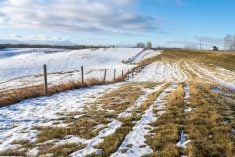A group of cattle from southern Saskatchewan seized by the Saskatchewan SPCA were sold at auction at Assiniboia, Sask., June 5.
The 287 head of “assorted cattle” were seized as part of a livestock cruelty investigation, said Kaley Pugh, manager of animal protection services for the Saskatchewan SPCA in Saskatoon.
While Pugh could say little about the seizure because of an on-going investigation, she said the animals were taken after both officers and a veterinarian deemed the animals from a cattle herd in the Avonlea area to be in distress.
Read Also

Federal budget draws mixed reaction from Canadian agriculture groups
The 2025 federal budget took a step forward in recognizing agriculture’s importance but failed to address pressing challenges like labour disruptions, interswitching and precision technology, say Canadian farm groups.
“This situation is a long-term, ongoing problem. We have had several files on these folks in the past.”
The animals were in “pretty terrible” condition, she said.
Roy Rutledge, general manager of Assiniboia Livestock Auction described the cattle as lean.
“Most of them were quite lean,” said Rutledge.
“They were quite thin.”
Rutledge said the cattle were an assortment of cow calf pairs, six to nine year old steers, last year’s calf crop and the year before’s calf crop.
“There was quite an assortment.”
Rutledge said the cattle industry needs to support the SPCA and their work and the decisions they make.
“If they deem the cattle need to go, it’s not up to the neighbours, or the rest of us to second guess them. Someone has to look out for these animals.”
Rutledge said the SPCA doesn’t “swoop down” and take the animals without warning, rather they give the owners several chances to fix the problems.
After the animals are sold and the SPCA and veterinarian costs are covered, the proceeds of the sale go back to the owners of the animals.
Rutledge said the older steers went for “canner cow” prices.
Pugh said it is not uncommon for the owners to buy back some or part of the animals with the money from the sale.
Pugh said 287 animals is a large number of animals to be seized. In 2009, about 300 animals were seized from a farm in the Outlook, Sask., area.
So far this year 186 and 105 animals from two other herds were also seized.
While most livestock producers do not have a problem caring for their animals, it is not uncommon to have problems after a long winter, she said.
“We always see an increase in cases when there is a bad winter or there are feed issues.”














